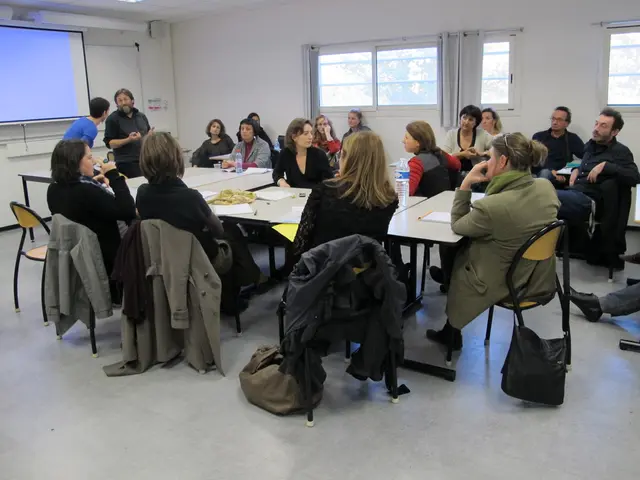Large-scale student abductions in Nigeria cause chaos within the educational system
The Dark Reality of School Kidnappings in Nigeria:
Since the infamous 2014 Chibok schoolgirl abduction, mass kidnappings of minors in Nigeria have skyrocketed. Over the past decade, more than 1680 children, many between the ages of 5 and 11, have been victims. This alarming trend doesn't seem to slow down, as the year 2024 witnessed horror after horror: six students and three teachers kidnapped in Ekiti state, 17 girls taken from a boarding school in Sokoto state, 287 students and staff from a school in Kaduna state, and over 400 people, mostly children and women, from a Borno state IDP camp.
The reasons behind this horrifying surge can be traced back to Nigeria's complex political and economic conditions. Terrorist organizations leverage mass kidnappings as a lever against the government and local communities, while violent gangs view ransom as a significant portion of their income. These criminal gangs meticulously gather information about their targets, often relying on local informants to assist in their planning. They then strike with brutal force, using shock and awe to overpower poorly-equipped guards and whisk away hostages.
The string of ransom negotiations that follow can leave families at breaking point. Desperate to reunite with their loved ones, families rush to pool their meager resources and, oftentimes, pay the ransom through informal channels. Unfortunately, government agencies are not always immune to these payments, but these deals remain under wraps.
Due to the remote locations of the abduction sites and the cyclical nature of these crimes, rescue operations face numerous challenges. The kidnapping of school children has evolved into a lucrative criminal enterprise, further complicating Nigeria's security crisis and crippling its educational system. The fear of more abductions is keeping one in three Nigerian children away from school.
Nigerian President Bola Tinubu acknowledges the severity of this crisis, vowing to implement a no-ransom policy, harsher penalties, improved law enforcement, and preventive measures such as modern surveillance technologies. However, critics argue that these measures lack coordination and resources, often falling short of ensuring success in both ransom negotiations and military-led rescue operations.
The wave of kidnappings isn't due to the lack of legislation but rather the weak enforcement. Nigeria ratified the Safe Schools Declaration in 2015, yet implementing effective measures remains a challenge, especially in rural areas where schools are most vulnerable.
Taking a Deeper Look:
- Underlying Economic and Political Factors: School kidnappings are often driven by economic gain, exacerbated by widespread poverty and unemployment in Nigeria. Furthermore, political instability and weak governance structures provide fertile ground for these criminal activities.
- Ethno-Religious Conflicts: Fulani bandits and Islamic extremist groups like Boko Haram and ISWAP frequently target specific ethnic and religious groups, highlighting the broader issue of sectarian violence in the country.
- Psychological Trauma: Kidnapped children endure deep psychological trauma, which affects their ability to learn and thrive.
- Disruption of Education: Frequent kidnappings disrupt educational systems, with schools forced to close temporarily, and attendance rates dropping.
- Socioeconomic Impact: The wave of kidnappings has a ripple effect on families and communities, exacerbating economic hardship, and destabilizing social structures.
Moving Forward:
- Effective Intervention: More effective and coordinated intervention from the government and international partners is crucial to address the deepening crisis of insecurity in Nigeria.
- Addressing Root Causes: Long-term solutions involve tackling economic inequality, political instability, and ethno-religious conflicts head-on.
- Civic Engagement: Encouraging civic engagement and community-led initiatives can help build resilience against kidnappings and improve overall safety.
- The ongoing wave of kidnappings in Sokoto, Ekiti, Kaduna, and Borno states, seen in recent years, is a critical component of the general news and crime-and-justice discourse in education-and-self-development, politics, and society.
- Integrating preventive measures, such as modern surveillance technologies and improved law enforcement, into education institutions in Sokoto and other high-risk regions will likely be instrumental in assessing and addressing the escalating issue of school kidnappings.
- The psychological trauma experienced by students who have been victims of kidnappings in Sokoto, Borno, and other parts of Nigeria poses an obstacle to their educational growth, leading to a need for specialized support services for self-development and rehabilitation.
- The political and economic conditions in Nigeria, including widespread poverty, unemployment, and instability, provide a fertile ground for organized crime, highlighted by the increase in school kidnappings in Sokoto and various other regions.
- In analyzing the political landscape in Sokoto and other Nigerian regions, it is essential to look beyond the surface-level issues of school kidnappings and recognize the broader interplay between ethno-religious conflicts, economic desperation, and political instability that fuel these heinous crimes.








